
Meet the Women On the U.S. Olympic Swim Team
by Peggy Shinn
She might be right. After eight days of competition at trials in Omaha’s CHI Health Center, established stars like King and Katie Ledecky and a wave of teenagers who are sure to be future stars made the women’s team headed to Tokyo. Benefitting from the year’s postponement of the Olympic Games, when they had time to add strength and develop into more mature athletes, 11 teenagers made the team, a notable increase from 2016 when Ledecky, then 19, was the only teenager on the Olympic swim team. the women’s team also has 20 first-time Olympians, a slight increase from 2012 and 2016.
USA Swimming qualified a full quota of 26 women in the pool, plus two open water swimmers. Here’s a look at who they are.
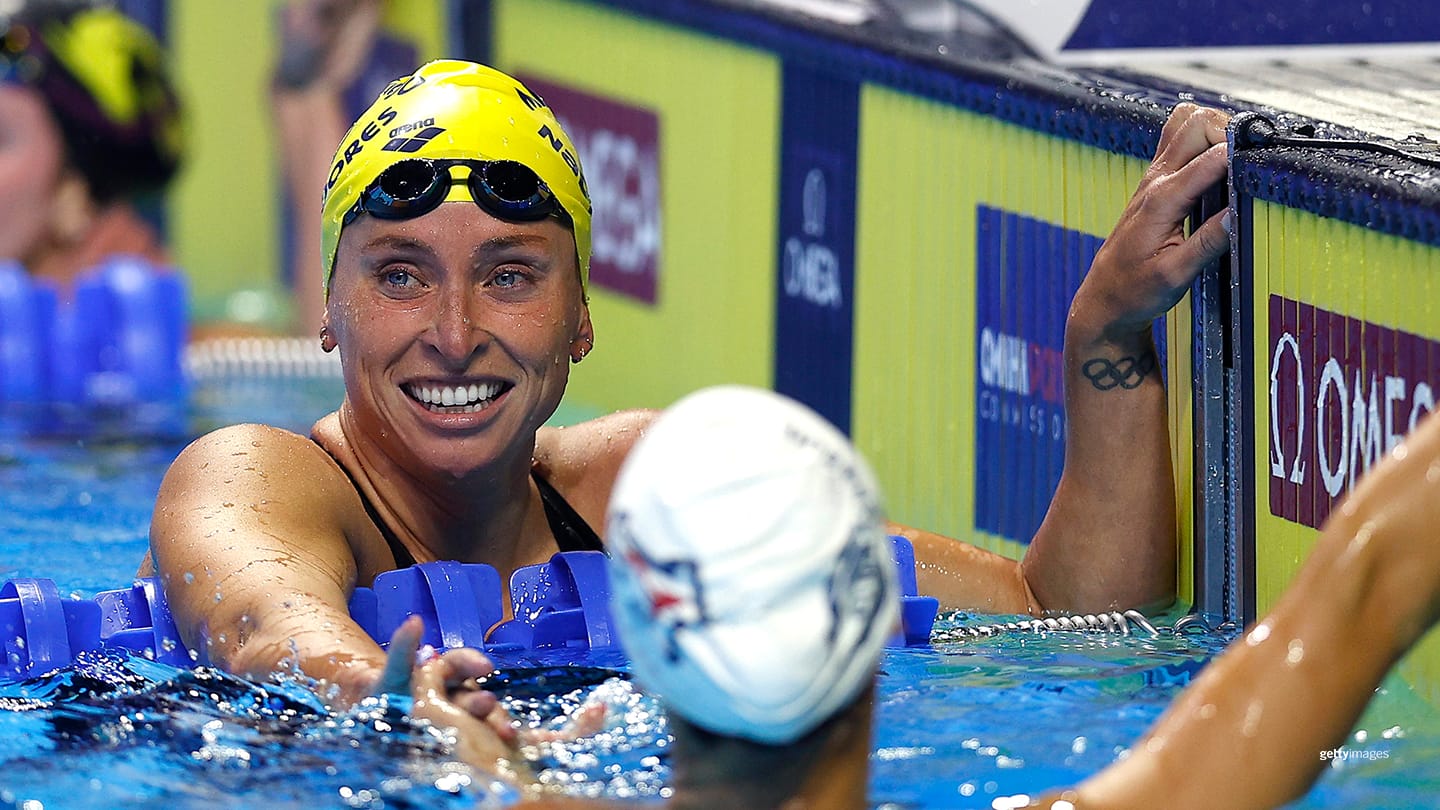
At her first Olympic Games in 2012, Haley Anderson was inspired after watching sister Alyssa win gold in the 4x200 freestyle relay. A couple of days later, Anderson won her own Olympic medal: silver in the open water swim.
Anderson then qualified for the Rio Games, finishing fifth in the waters off Copacabana Beach. Now 29, Anderson qualified for her third Olympic team after she finished fifth in the 2019 world championships.
She also tried to qualify for Tokyo in the pool but finished fourth in the 1,500, then was barely out-touched in the 800, touching the wall third by 0.15 of a second. Anderson is one of only three multi-time Olympians on the U.S. women’s swimming team in Tokyo, along with Katie Ledecky (three-time Olympian) and Allison Schmitt (four-time Olympian).

A two-time Olympic gold medalist, Lilly King qualified for her second Olympic Games in both breaststroke events. It was what the outspoken Indiana swimmer expected. She has not lost a long-course 100-meter breaststroke race since December 2015 — back when she was a freshman at Indiana University.
Now 24, King goes to Tokyo as a veteran and will help lead the younger group of teens — the same way Olympic veterans helped her at the 2016 Games. She will remain as outspoken and confident as ever. “I go in confident,” she said. “That’s the only way I know I can do it. Going in not being sure of myself is not a good way to race.”
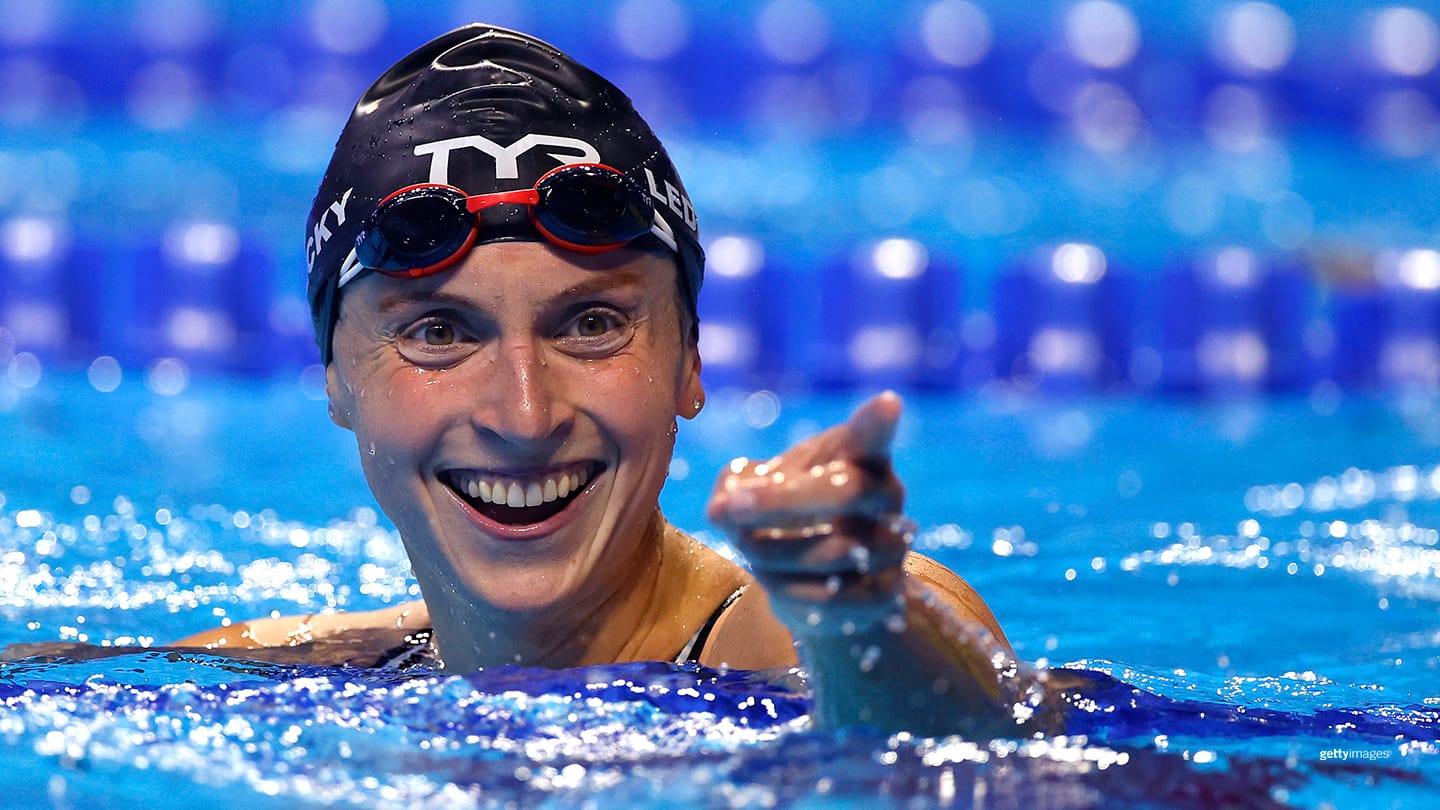
Katie Ledecky qualified for Tokyo in four freestyle events — from the 200 to the 1,500 — and is a favorite to win them all. With five Olympic gold medals already and one silver from the past two Olympiads, Ledecky could very well win five more medals, for 11 total.
Should those five medals be gold, the 24-year-old Stanford grad would have 10 total Olympic gold medals — surpassing Larisa Latynina, the Soviet gymnast who won nine golds from 1956-1964. After the first night of Olympic trials, hearing her family call her a three-time Olympian brought Ledecky to tears.
During trials, Michael Phelps called her “the greatest female swimmer of our time.”
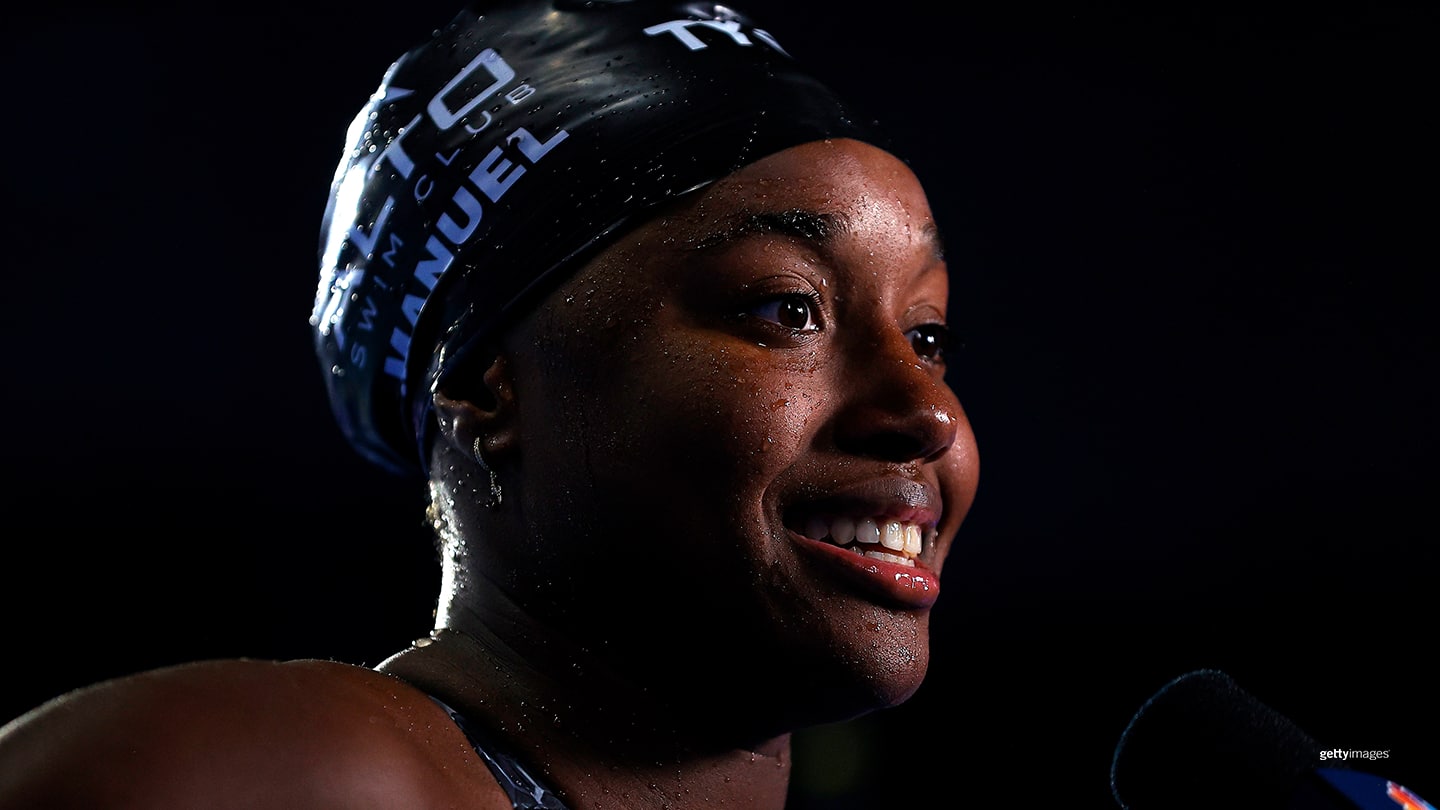
A breakout star in Rio, Manuel became the first Black swimmer to win an Olympic gold medal when she tied for first in the 100 freestyle. She also won silver in the 50 freestyle. Then over the next three years, Manuel won nine world championship gold medals, including an astounding five in 2017.
At 2019 world championships, she came home with seven total medals. But the 24-year-old came to 2021 Olympic trials with OTS (overtraining syndrome) and did not qualify in the 100 freestyle. Diagnosed with OTS in March, she took three weeks off training, then returned to the pool on April 17. She had hoped that her belief in herself would be enough to make the 2021 U.S. Olympic Team.
She fell short in the 100 free, not qualifying for the semifinals. But in an emotional race, she prevailed in the 50, winning the race by one-hundredth of a second and making her second Olympic team.
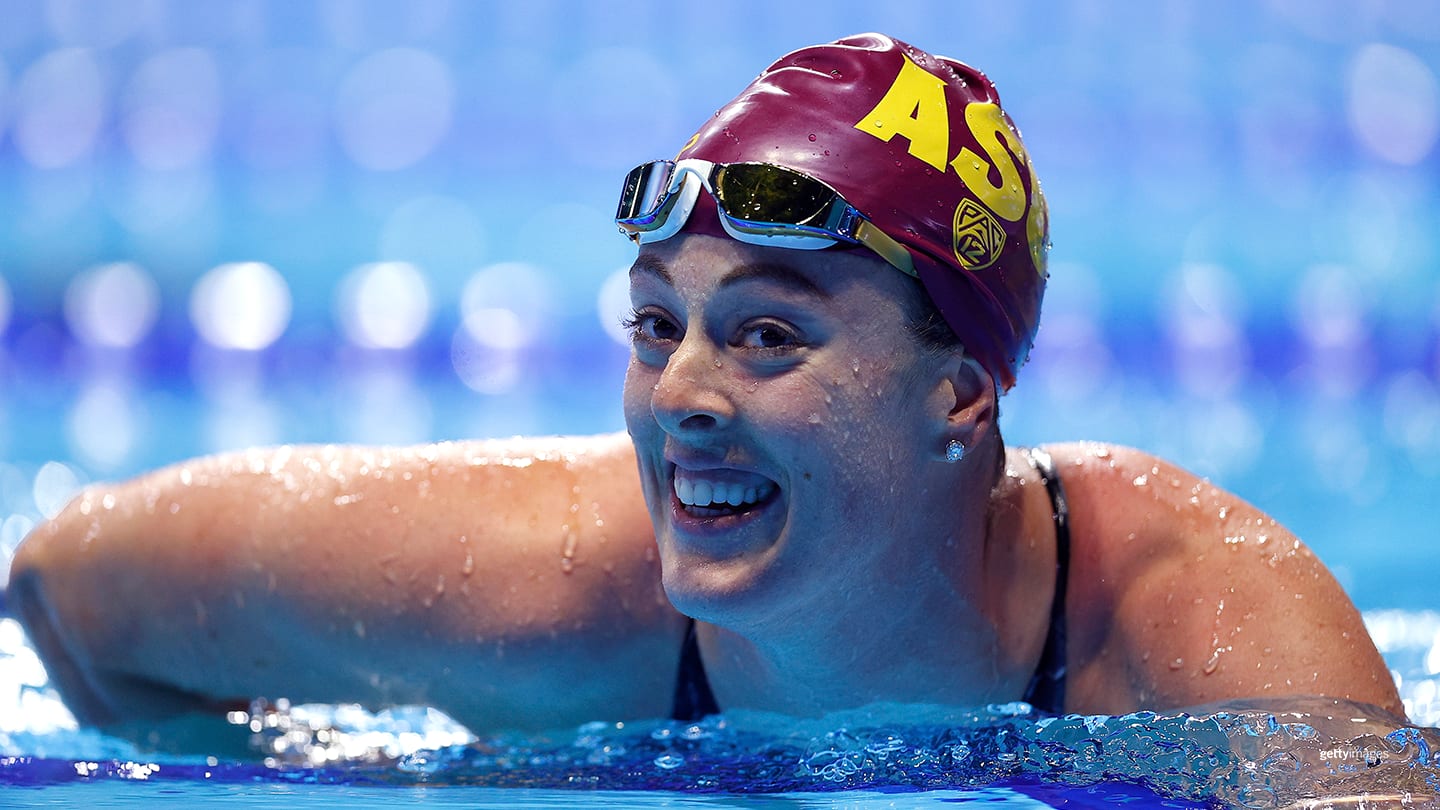
Even before qualifying for her fourth Olympic team, Allison Schmitt is a legend. The 31-year-old with a big smile has won medals (eight and counting) in every Olympic Games since her first in 2008, when she was 18 years old and helped the U.S. take bronze in the women’s 4x200 freestyle race.
She really shone in London, claiming the 200 freestyle gold, silver in the 400 freestyle, then adding two more gold medals in the freestyle relays. In Rio, she won another gold and silver in the freestyle relays. She will likely add more in Tokyo. In addition to qualifying for the 200 freestyle, she will compete in the 4x200 freestyle relay and will likely swim the prelims of the 4x100 freestyle relay as well (after finishing sixth in the 100 free at trials).
But Schmitt is known for more than her Olympic medals. She opened up about her depression and has used her platform to bring awareness to mental health.

In 2016, as a 21-year-old, Olivia Smoliga qualified for her first Olympic Games in the 100-meter backstroke. Back then, she was in awe of the U.S. women’s backstroke domination at the Olympic Games and did not yet feel up to the challenge. She finished sixth in Rio, then won an Olympic gold medal leading off the women’s medley relay in the prelims.
At 2019 world championships, she won a bronze medal in the 100 back. But Smoliga missed qualifying for the Tokyo Games in the 100 back — a real blow. But the 26-year-old dug herself out of the disappointment and finished third in the 100 freestyle, giving her a spot on the 4x100 freestyle relay in Tokyo. She trains in Athens, Georgia, with the Athens Bulldog Swim Club and qualified for the relay along with teammate Natalie Hinds.
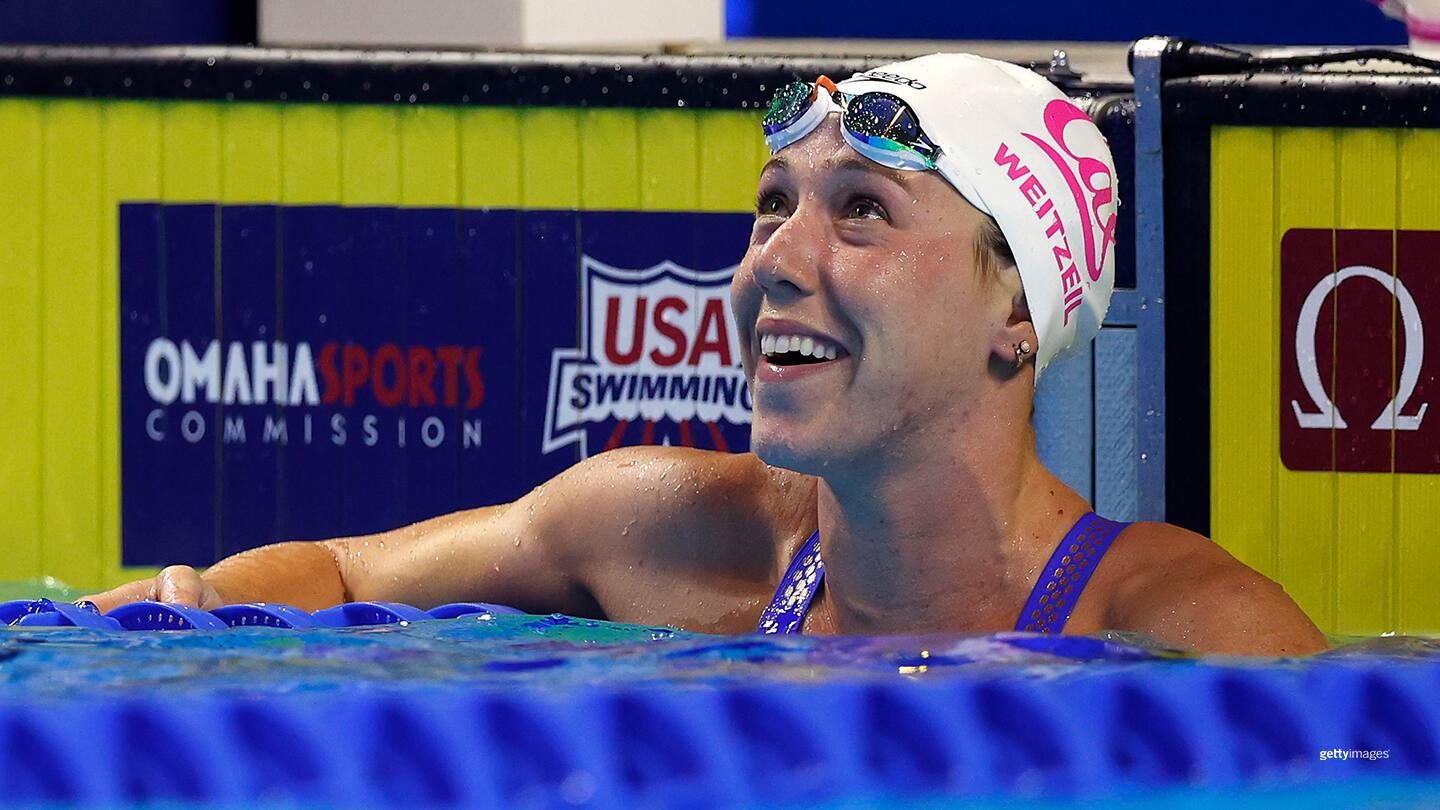
A freestyle sprinter, Weitzeil won the 50 and 100 freestyle races at the 2016 U.S. Olympic Team Trials, then came back five years later and won the 100 at 2021 trials and finished second in the 50.
In Rio, Weitzeil finished seventh in the 100 free and didn’t make the final of the 50 free. But Weitzeil helped the U.S. win silver in the 4x100 freestyle relay and gold in the medley relay for her role swimming the prelims. In the Rio freestyle relay, her split was the fastest on the team.
Now the 24-year-old Cal grad will lead the U.S. women as they take on Australia in the freestyle relay. In December 2019, during her senior year at Cal, Weitzeil became the first woman to ever swim the 50-yard freestyle under 21 seconds.
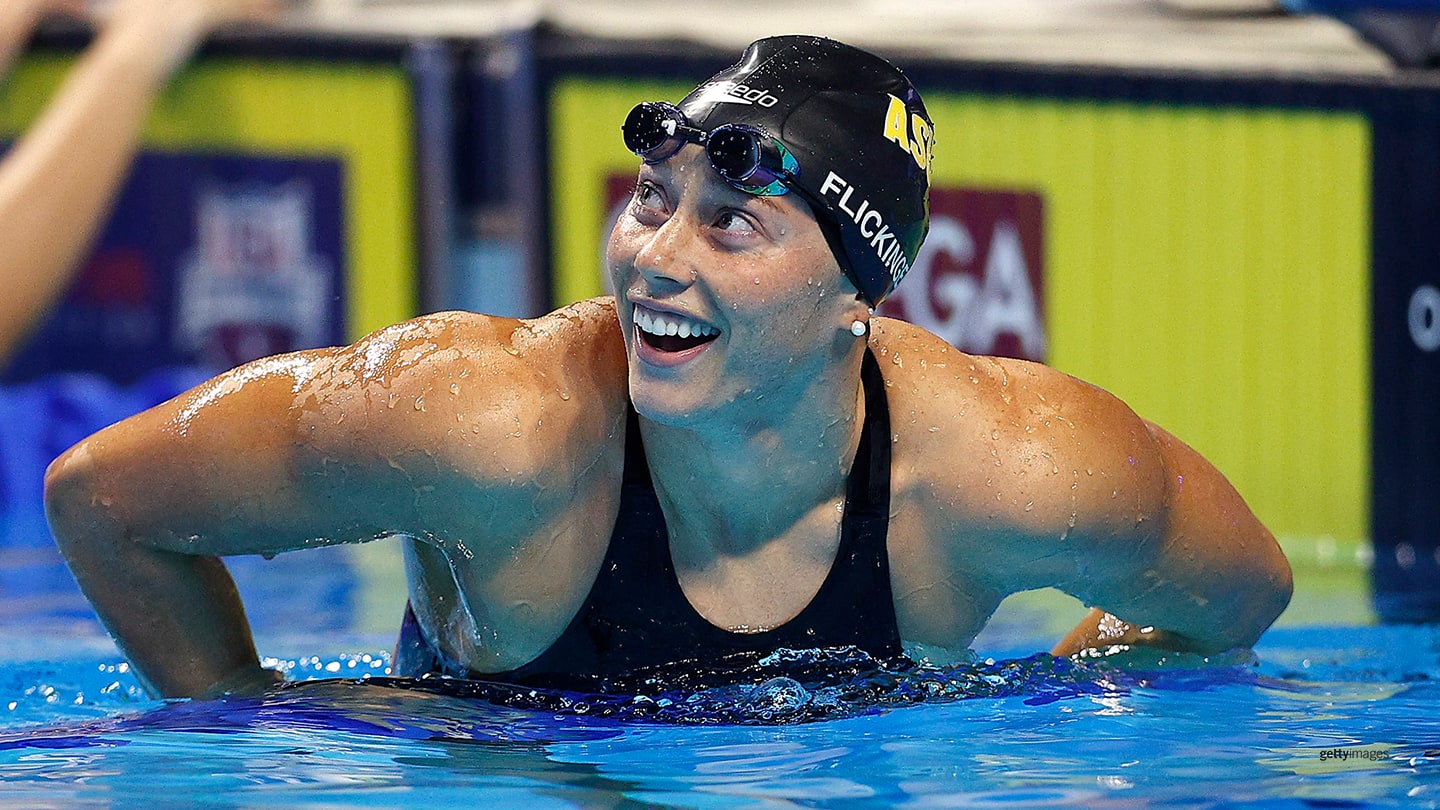
At the 2016 Olympic Games in Rio, Hali Flickinger finished seventh in the 200-meter butterfly and was one of few U.S. swimmers to leave Rio without a medal. That could change in 2021.
The 26-year-old who swam for the University of Georgia moved to Arizona in 2019 to train with Bob Bowman, Michael Phelps’s coach, and has become a regular on the international podium. A two-time world championship medalist (gold in the 4x200 free relay in 2017; bronze in the 200 fly in 2019), Flickinger won the 200 fly at the 2018 Pan Pacs.
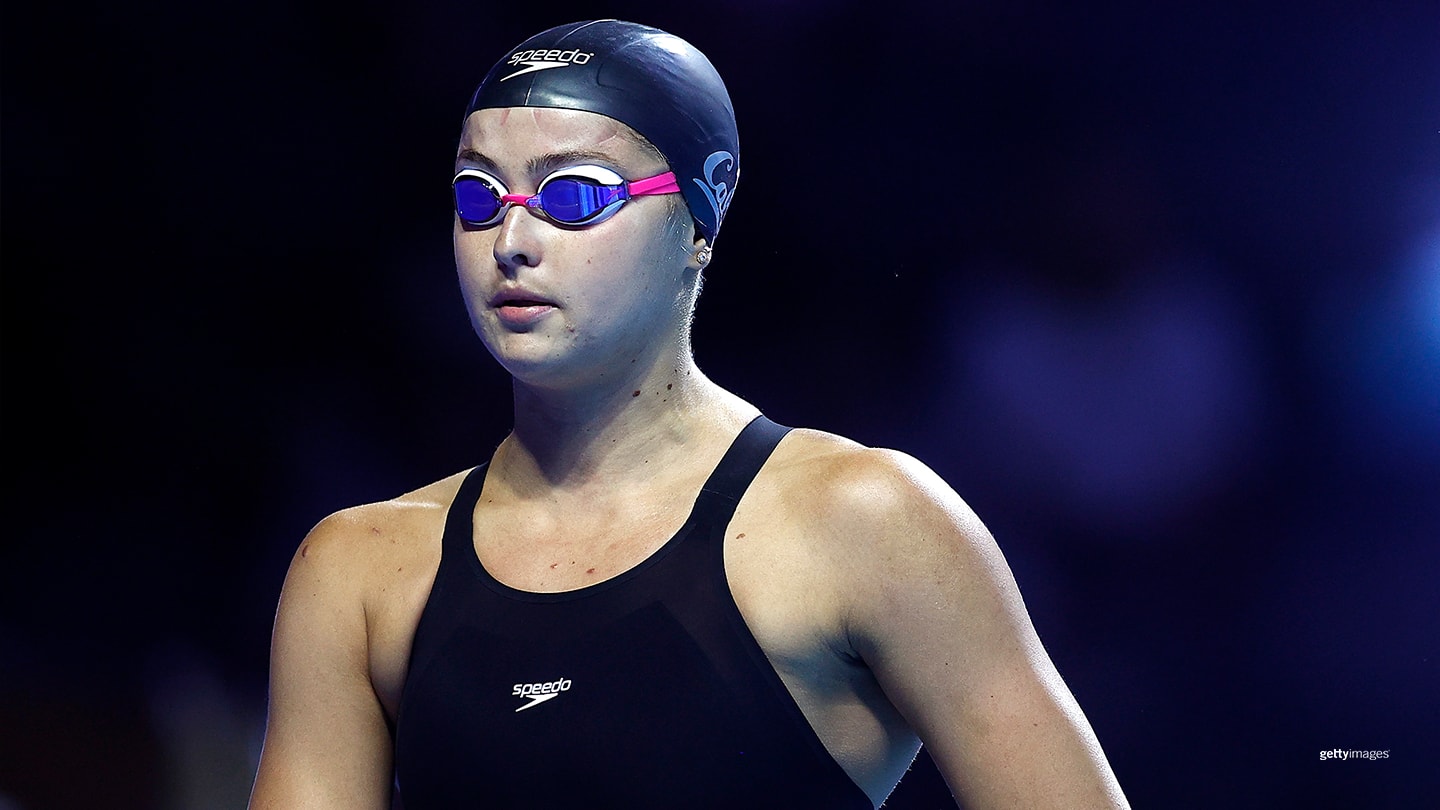
After Katie McLaughlin helped the U.S. win a world title in the 2x400 freestyle relay at the 2015 world championships, plus a silver in the mixed medley relay, the Cal swimmer was a favorite to make the U.S. Olympic team in 2016. But she suffered a neck injury during a college training camp that year and missed making the cut.
She recovered, then earned more world championship hardware in three relays in 2019. Now a college graduate, the 23-year-old will be a key member of the freestyle relay team and perhaps the medley and mixed medley relays too. In addition to training for the 2020 Olympic Games, McLaughlin also worked as a swim coach. The job helped give her purpose beyond achieving her Olympic dream.

Erika Brown swam for the University of Tennessee and was a key swimmer on the Vols’s relay team, winning the 4x50 yard relay at 2019 NCAAs. She also finished runner-up in the 50 free at NCAAs in both 2018 and 2019.
In sum, she won 18 SEC gold medals, and set a short-course world record as part of a relay. But her senior year, she had to cope with the abrupt end to her college career due to the Covid-19 lockdown. By finishing second in the 100 freestyle at trials, she will compete in both the individual event in Tokyo, plus the 4x100 freestyle relay. From Modesto, California, Brown is a devout Christian.
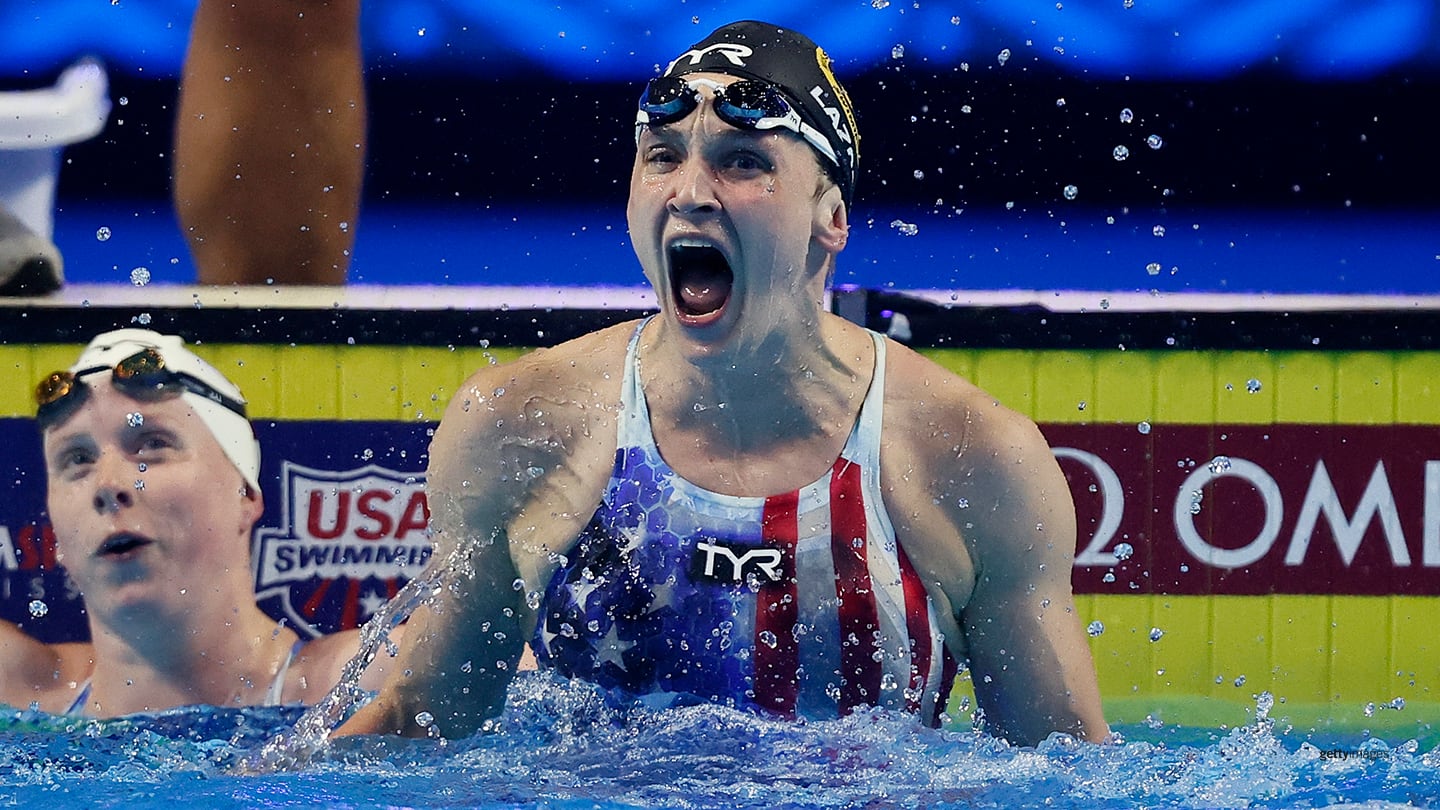
Annie Lazor’s trip to Tokyo has not been easy. The 26-year-old from Michigan quit swimming after she didn’t make the 2016 U.S. Olympic Team in breaststroke. She returned to Auburn University to finished her degree, then took a job in the athletic department at the University of California-Berkeley. But she missed the sport of swimming so she joined Indiana’s program — home to Lilly King—and was soon winning international medals.
Then on April 25, 2021, Lazor’s father passed away suddenly. He was one of his daughter’s biggest fans. The 2021 U.S. Olympic Team Trials was her first meet since his death. With the support of friends and family — and King — Lazor qualified for Tokyo in the 200 breaststroke. Lazor’s time in the 200 breaststroke at trials would have won the silver medal in Rio.
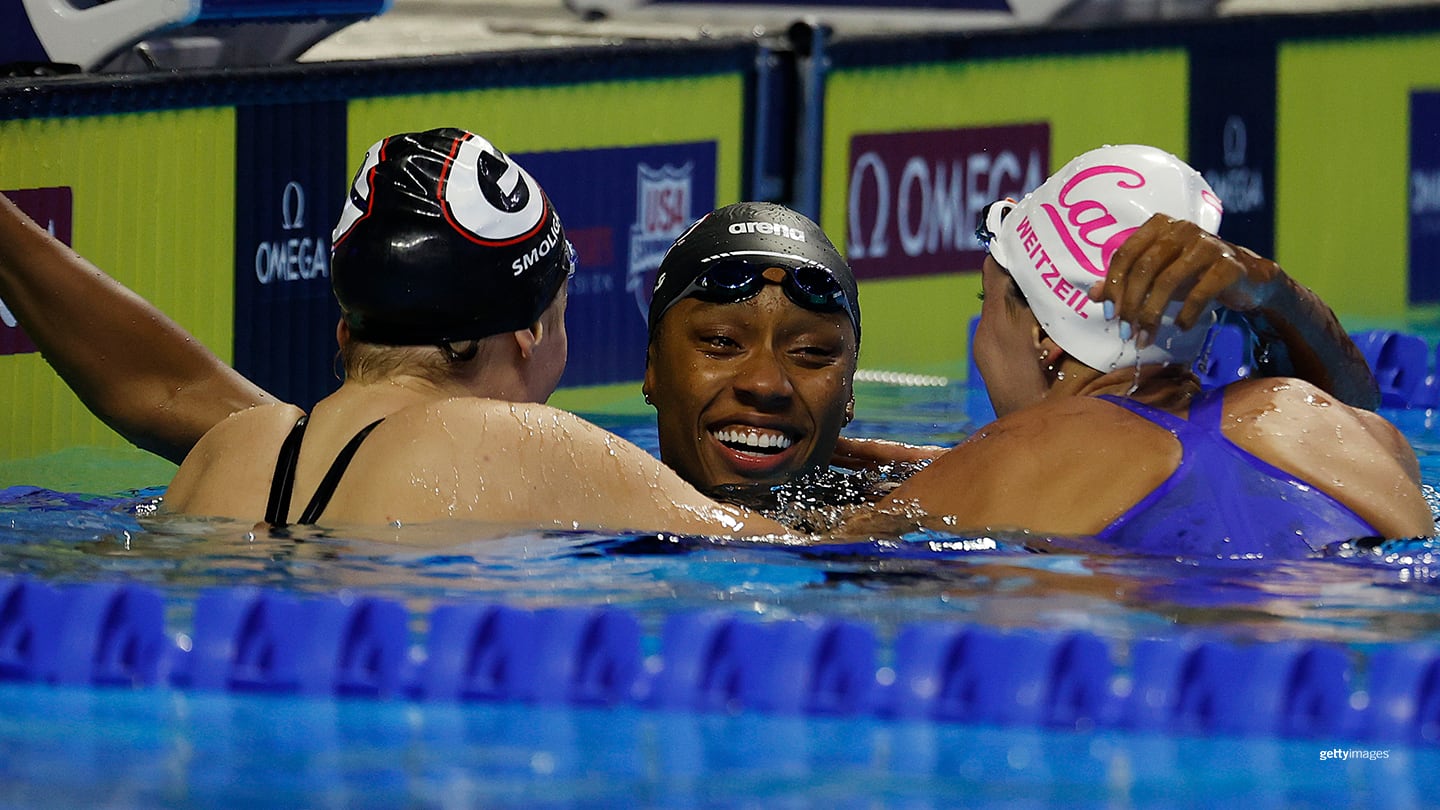
A University of Florida graduate, Hinds won several NCAA individual medals as a freestyle sprinter but quit swimming after a disappointing 2016 Olympic trials. She finished her degree, moved to Atlanta, then took an internship at Turner Broadcasting, among other tasks designing the March Madness app.
But watching 2018 nationals, she was lured back to the sport. So she quit her job, moved to Athens, and began pursuing her Olympic dream again. Now 27, she still has a photo that she snapped at 2016 trials with Olivia Smoliga. “We didn’t know five years later we would be talking about the 100 free final together,” she said — and about making the 2020 U.S. Olympic Team.
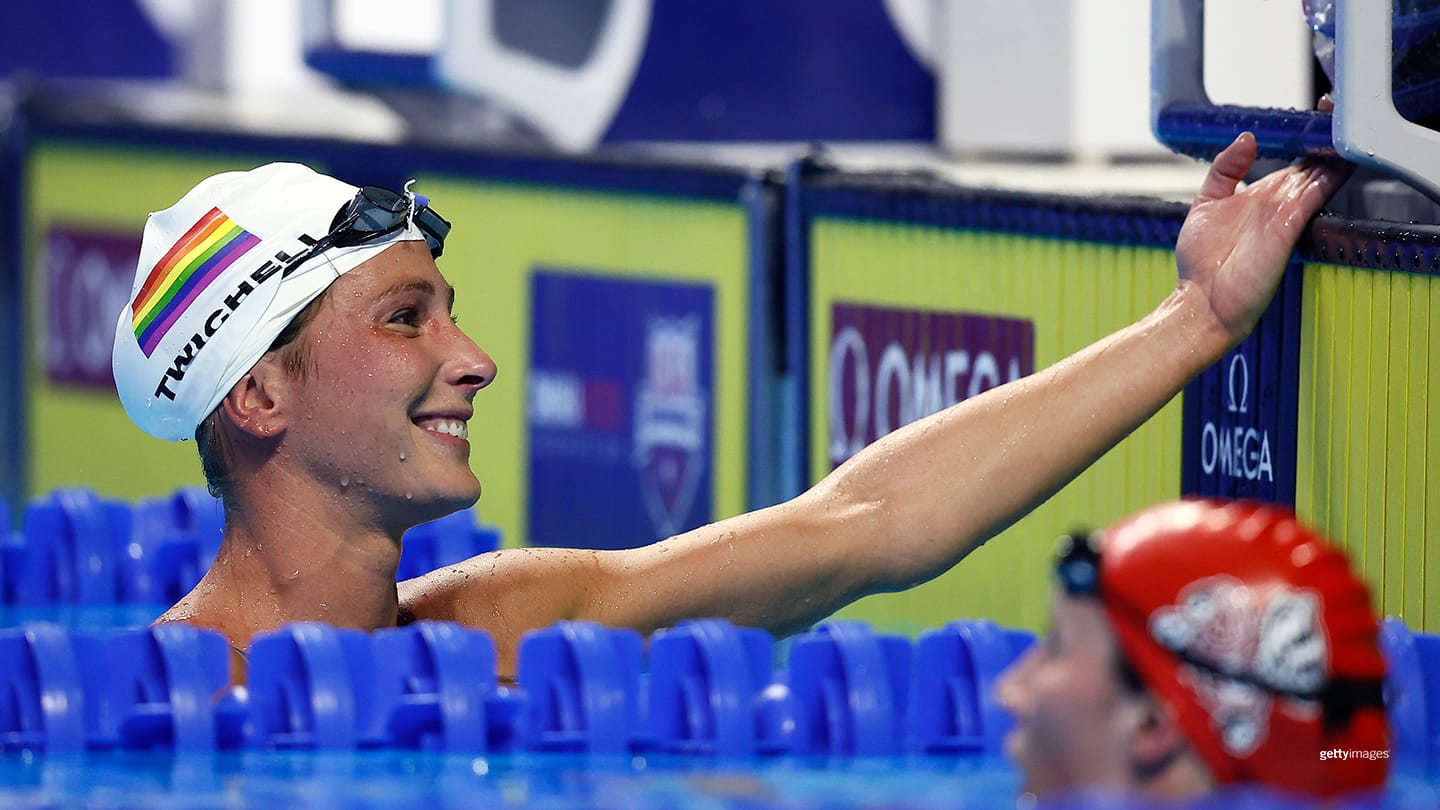
Along with Haley Anderson, Ashley Twichell, 32, became the first one of the first athletes to qualify for Tokyo when she finished sixth in the 10-kilometer race at the 2019 open water world championships. A former pool swimmer, Twichell won a silver medal at the 2011 Pan Am Games in the 800 freestyle. That same year, she claimed a bronze medal at open water world championships in the 5k race.
Since then, she has won four more world championship medals in open water, but at the 5k distance. After trying to make the U.S. Olympic Team in 2008, 2012, and 2016, Twichell finally made it on her fourth try. But she plans to retire from competitive swimming after the Tokyo Games.

As a freshman at the University of Wisconsin this year, 18-year-old Phoebe Bacon became the 2021 NCAA 200-yard backstroke champion. A 2019 Pan Am gold medalist, she came to 2021 Olympic trials as the top-ranked 200 backstroker in the country, with the third fastest 200 back time in the world to date this year, and then dropped her time even more.
Bacon grew up in Maryland and attended the same elementary school as Katie Ledecky, with Ledecky (six years older) serving as Bacon’s “big buddy” in pre-school. When Ledecky won an Olympic gold medal at the 2012 Games, it made Bacon realize what was possible in swimming.
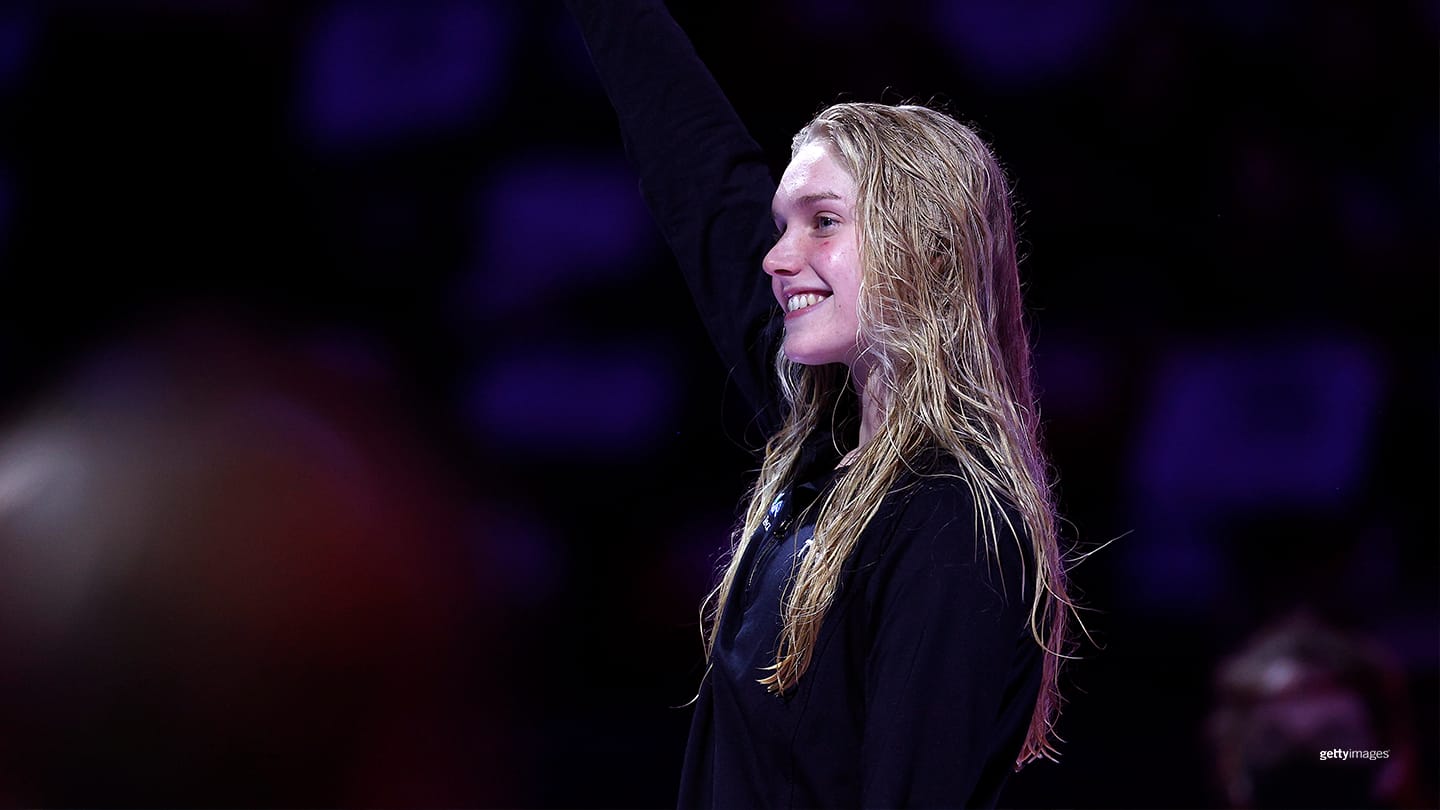
“Terrified” to swim her first final at trials, 16-year-old Curzan was all smiles at the end of the women’s 100-meter butterfly. Her second place finish put her on her first Olympic team — a realization that almost brought Curzan, known for her smile, to tears.
From Cary, North Carolina, Curzan benefited from the Olympic postponement, using the extra year to “get bigger, faster and stronger.” She has not committed to a college yet. She turns 17 on June 30, 2021, but is still one of the youngest on the U.S. Olympic swimming team.
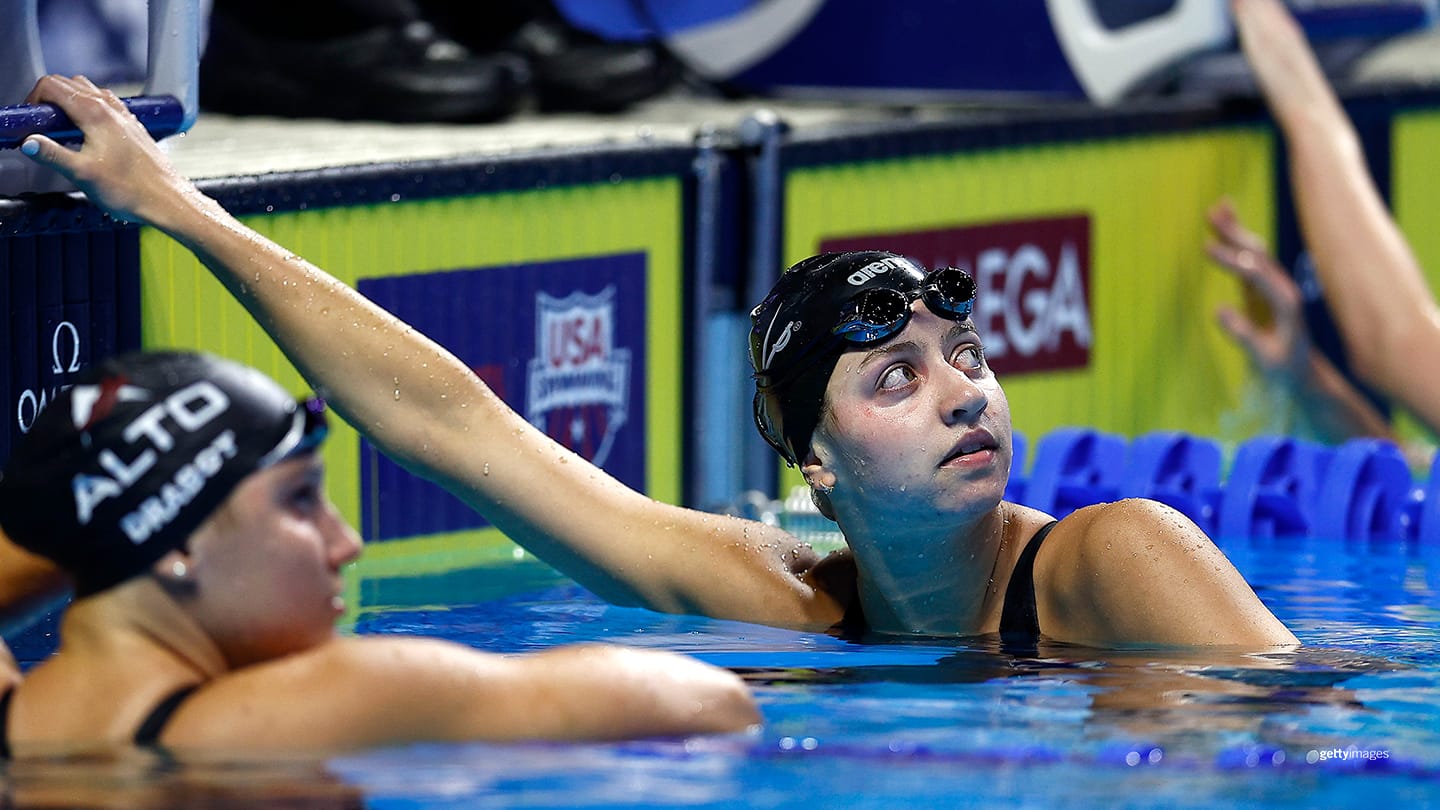
A versatile swimmer, Kate Douglass, 19, came to trials as the reigning NCAA 50-yard freestyle champion (and runner-up in the 100 free and 100 fly). In the 200 IM finals at trials, she hunted down University of Virginia teammate Alex Walsh in the final 50 of the 200 IM and almost out-touched her, lowering her personal best by over two-thirds of a second and showing the extra work she put into her 200 IM during the Olympic postponement.
Walsh and Douglass are training partners and best friends at UVA, pushing each other and keeping each other calm before races. Douglass competed in the 2018 Youth Olympic Games in Buenos Aires, with her best finish in the 200 IM (sixth).
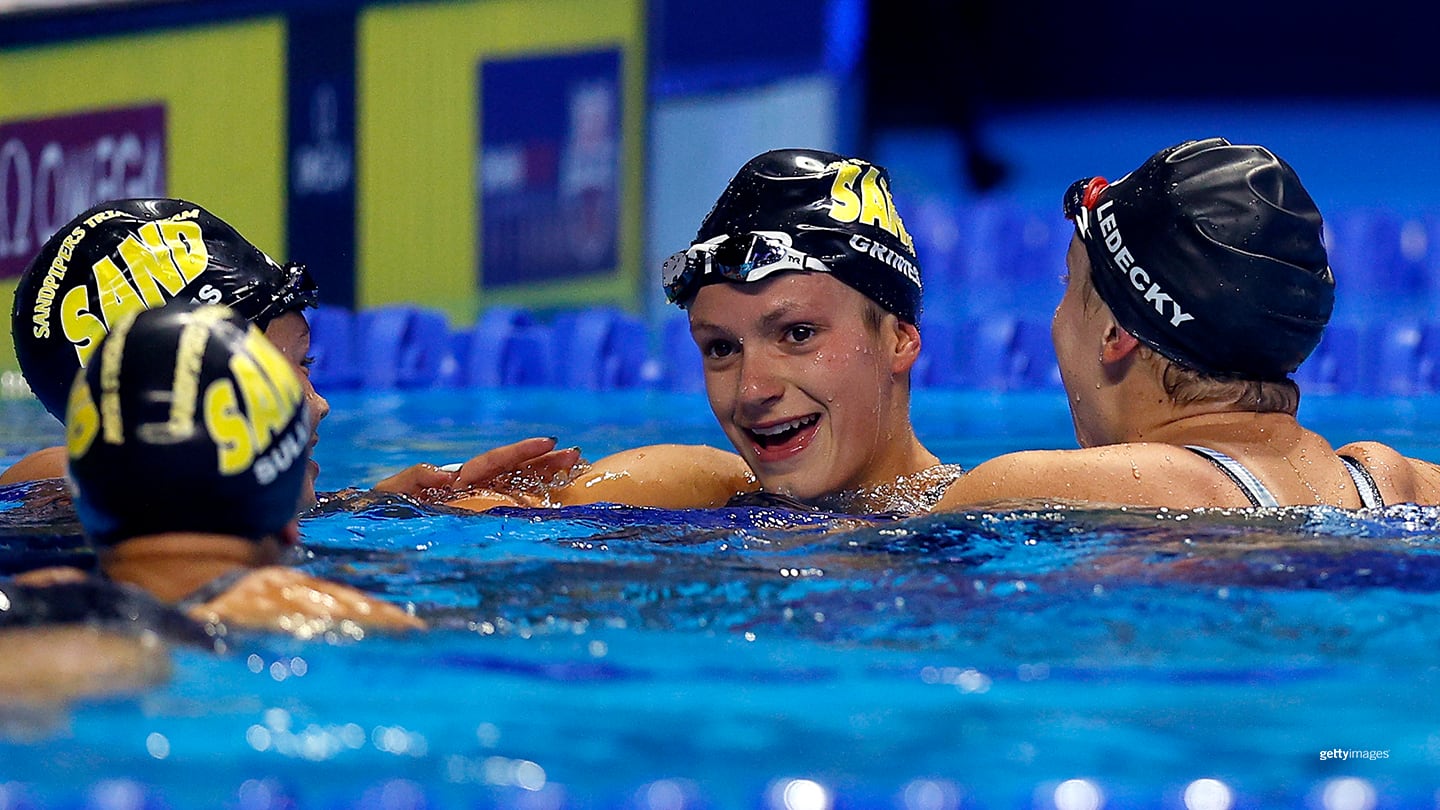
No one was more surprised to qualify for an Olympic team than 15-year-old Katie Grimes. Swimming for the Sandpipers of Nevada, Grimes has looked up to Katie Ledecky — even being happy that they have the same name — for years and never imagined being on a team with her.
Ledecky called Grimes “the future” of women’s distance swimming after her third place in the 1,500 at trials, then said she is “the now, the present” of distance swimming after Grimes qualified for Tokyo in the 800. The Tokyo Olympic Games will be Grimes’s first trip out of the country. Her time of 8:20.36 was just over a half-second slower than Ledecky’s trials winning time of 8:19.78 in 2012 — just a few weeks before she won her first Olympic gold medal.

Torri Huske, 18, missed her high school graduation to compete at trials last week. But it was worth it. She flew onto her first U.S. Olympic Team by winning the women’s 100-meter butterfly — breaking the American record, the second time in two nights. Her winning time in the finals of 55.66 is the fifth fastest all-time and is over a third-of-a-second faster than 2012 Olympic gold medalist Dana Vollmer’s former record.
Huske is one of several teenagers who benefited from the postponed Olympic Games. She used the Covid-19 lockdown to improve her strength. Huske’s mother, Ying, who grew up in China and immigrated to the U.S. in 1991, introduced her daughter to swimming and is an inspiration to Huske.
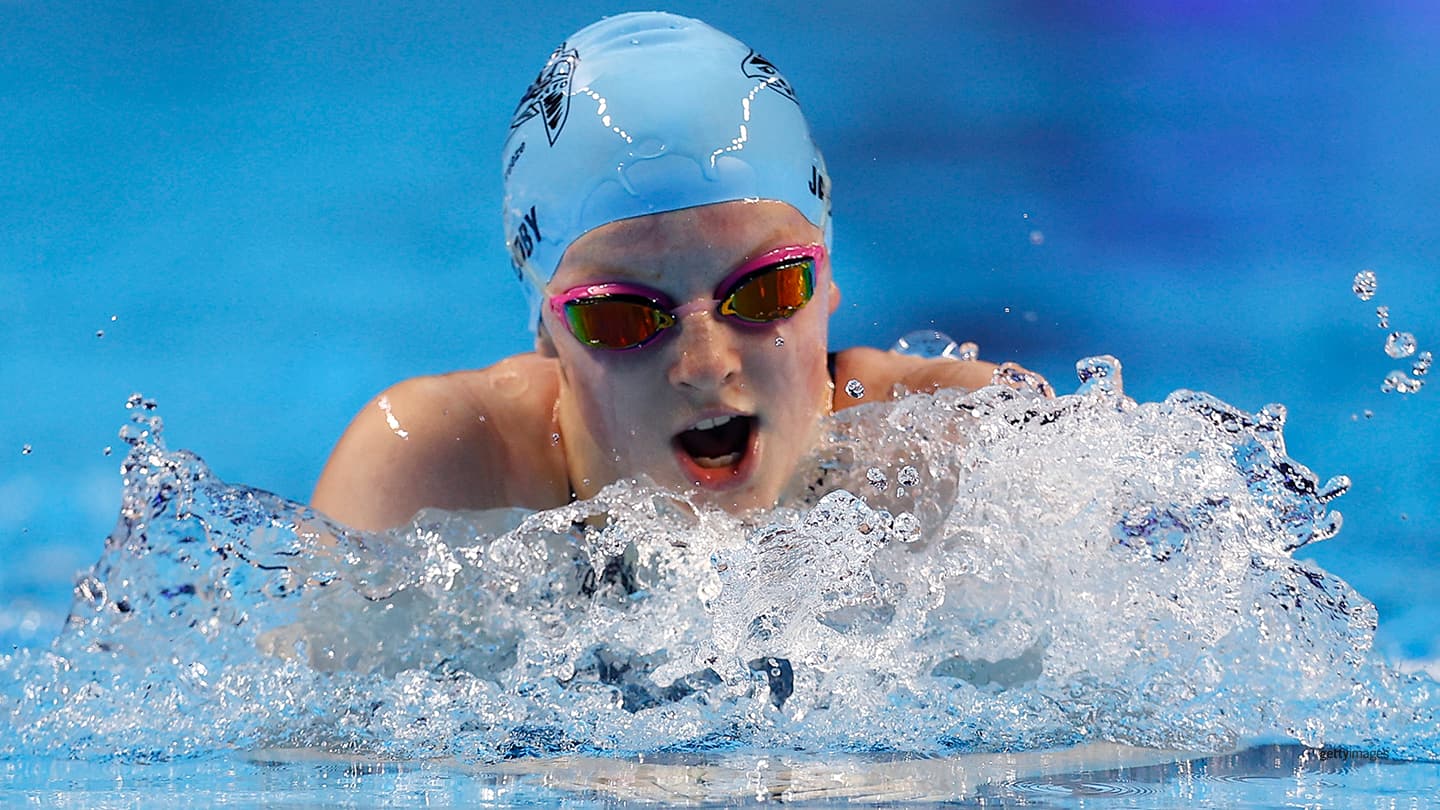
Lydia Jacoby is proof that a swimmer does not have to grow up in a “swimming state.” The 17-year-old is the first Alaskan to make a U.S. Olympic Team in swimming.
From Seward, a city on the Gulf of Alaska, Jacoby started swimming at age 6 to be safe in the water in this marine town and soon joined the Seward Tsunami Swim Club. She qualified for Olympic Trials in 2020. But it was not until 2021 that her times began to drop into the eye-opening range.
To train during the Covid-19 lockdown, Jacoby cross-country skied, ran with ice cleats, lifted weights in her garage, and traveled to Anchorage (home of the only 50-yard pool in the state). A musician in a musical family (her grandfather builds guitars), Jacoby sings and plays double bass in a bluegrass band called the Snow River String Band. She also plays guitar and piano, wrote a column for her high school newspaper, and is active in theater. Of note: Jacoby’s winning time in the 100 breaststroke at trials would have earned her a silver medal behind Lilly King at the 2016 Olympic Games.
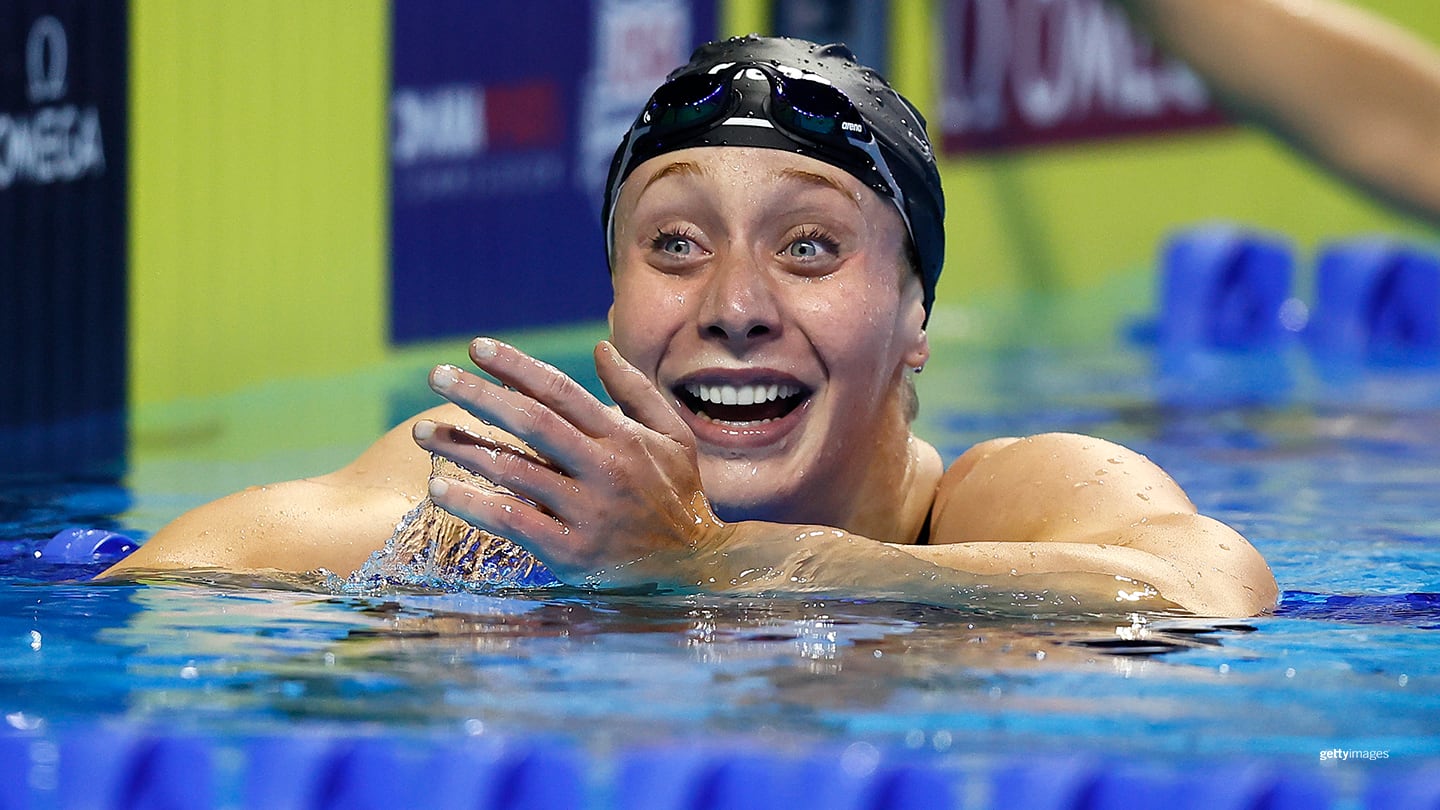
Paige Madden has been on a roller coaster this year. A three-time NCAA individual champion — winning the 200, 500, and 1,650 freestyles in March 2021 and helping the University of Virginia win its first ever NCAA title in women’s swimming — Madden then caught Covid-19 between receiving her first vaccine and the second dose (chest pain is a lingering symptom).
It was a continuation of a roller coaster ride that began two years ago for the 22-year-old from Mobile, Alabama. She tore her meniscus in 2019 — a tough injury for a swimmer known for her strong kick — then had surgery and could only pull with her arms in the water for the three weeks leading up to the 2019 World University Games. But the upper-body strength that she gained paid off: she won a silver medal in the 200 free and helped the U.S. win gold in the 800 free relay at WUGs. At 2021 Olympic trials, Madden dropped her personal best in the 400 free by over four seconds. Another drop between now and Tokyo could put her on the Olympic podium.
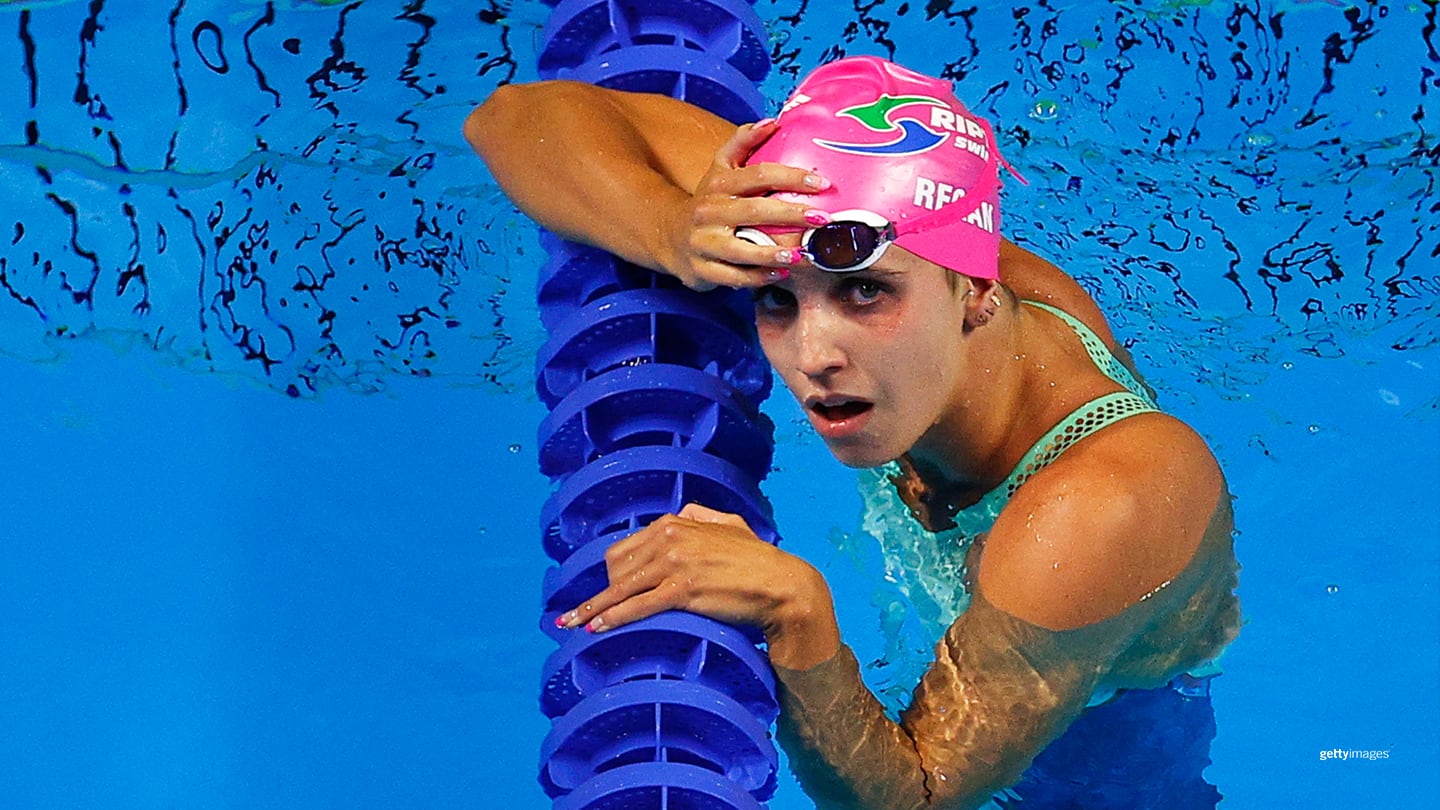
Regan Smith burst onto the scene at age 15 at the 2017 national championships, qualifying for the world championships in the 200 backstroke. Two years later, the Minnesotan set two world records in backstroke at 2019 worlds and became a medal favorite in Tokyo. Pretty good for a swimmer once afraid of backstroke.
Smith made her first Olympic team after overcoming nerves in the 100 backstroke — and a tough year where her confidence waned. Look for Smith — now 19 and going to Stanford in the fall — to regain her 100 backstroke world record in Tokyo. She lost it on the eve of trials to Australian Kaylee McKeown. The Tokyo Games will also be the first international meet where Smith will compete in butterfly.
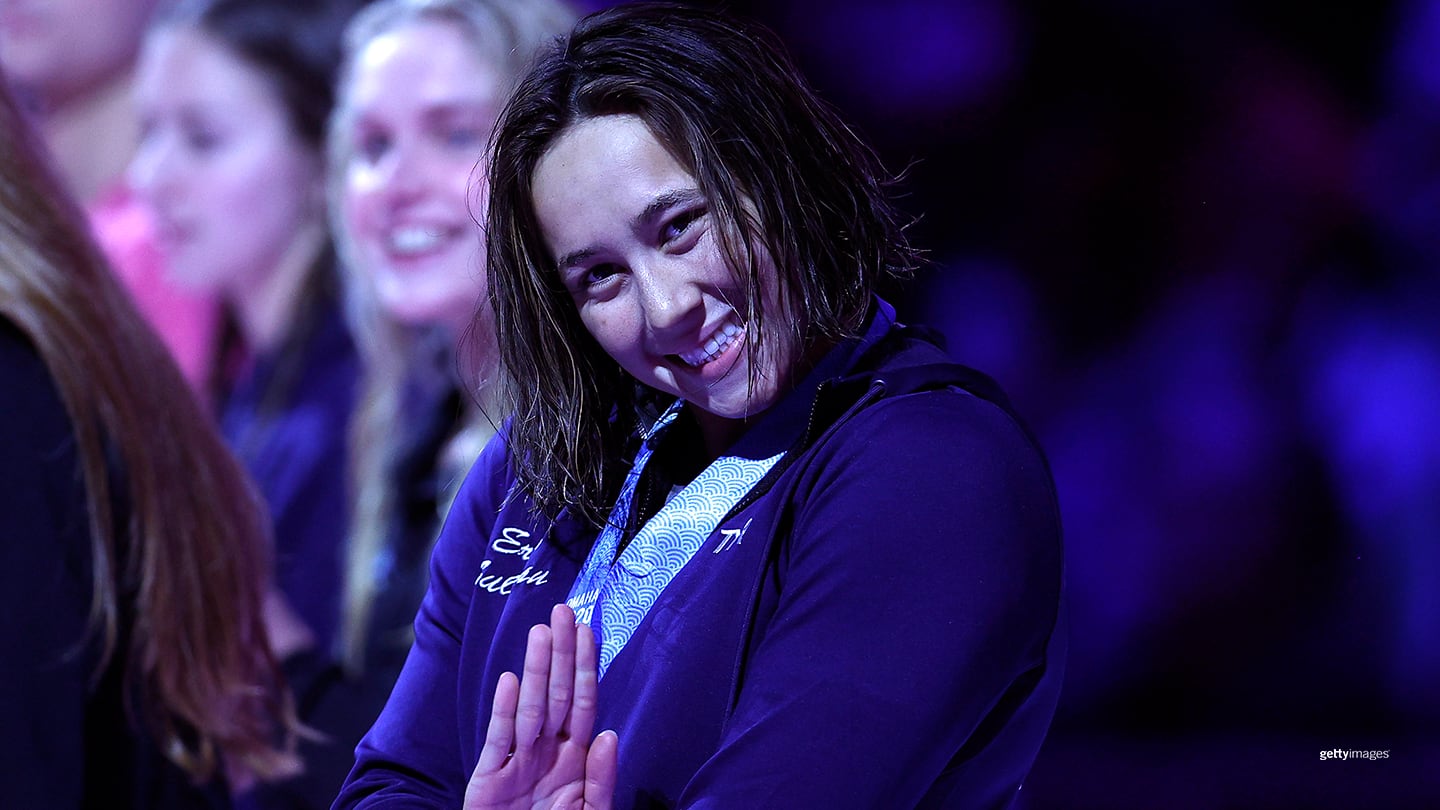
Known for her open water credentials (fifth in the 25k at 2019 worlds), Erica Sullivan made her mark in the 1,500 freestyle at trials, staying with Katie Ledecky for the first half of the race, then touching the wall in second place just over 10 seconds behind Ledecky — and beating her open water idols, Haley Anderson and Ashley Twichell, who finished the 1,500 in fourth and fifth, respectively.
Sullivan, 20, is most proud of the mental health barriers she overcame after her father — who supported her Olympic dream — passed away from esophageal cancer in 2017. She was only 16 at the time and hit rock bottom after his death. To achieve her Olympic dream, Sullivan had to overcome anxiety, panic attacks, depression and post-traumatic stress disorder in the past few years. From Las Vegas, Nevada, Sullivan postponed college in 2018 and will attend the University of Texas after the Tokyo Games.
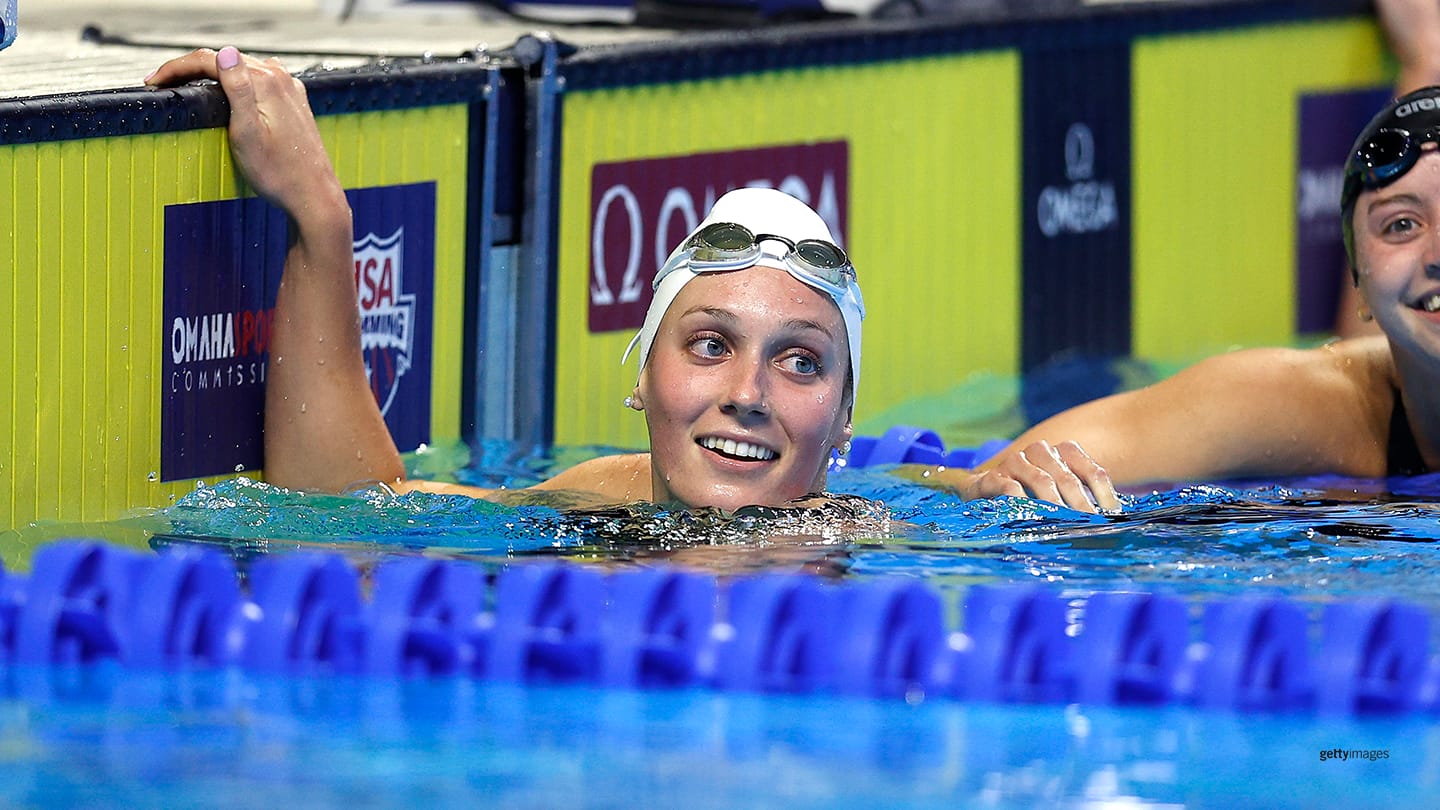
Fresh off her freshman year at the University of Virginia, 19-year-old Alex Walsh was both motivated and comforted by her UVA teammates who made a splash at trials, especially Madden and fellow 200 IMer Kate Douglass.
Walsh won the 2021 NCAA 200 IM title — after asking her coach if she could train the event to improve her speed in distance races. She’s also the 2019 Pan Am gold medalist in the 200 backstroke and 200 IM. From Tennessee, Walsh is often mentioned with her younger sister, Gretchen, 18, who was seeded seventh in the women’s 100 freestyle but did not advance out of prelims. Her younger sister then finished fifth in the 50 free.

Emma Weyant, 19, watched the Rio Olympic Games with her Sarasota Sharks teammates at home on TV. Five years later, the Floridian will compete in the Games.
The oldest of four sisters, Weyant had the support of younger sister Gracie, 15, who won the 200-meter breaststroke during Wave I of the U.S. Olympic Team Trials — Swimming and qualified to compete in Wave II. Gracie helped Weyant keep her nerves in check going into the 400 IM final. In Tokyo,
Weyant could be the next American woman to win a medal in the 400 IM; Maya Dirado took silver in the event at the 2016 Games and American women have won medals in the 400 IM in every Olympiad since 2004. Weyant’s time was 0.08 of a second off Dirado’s 400 IM winning time at 2016 trials.
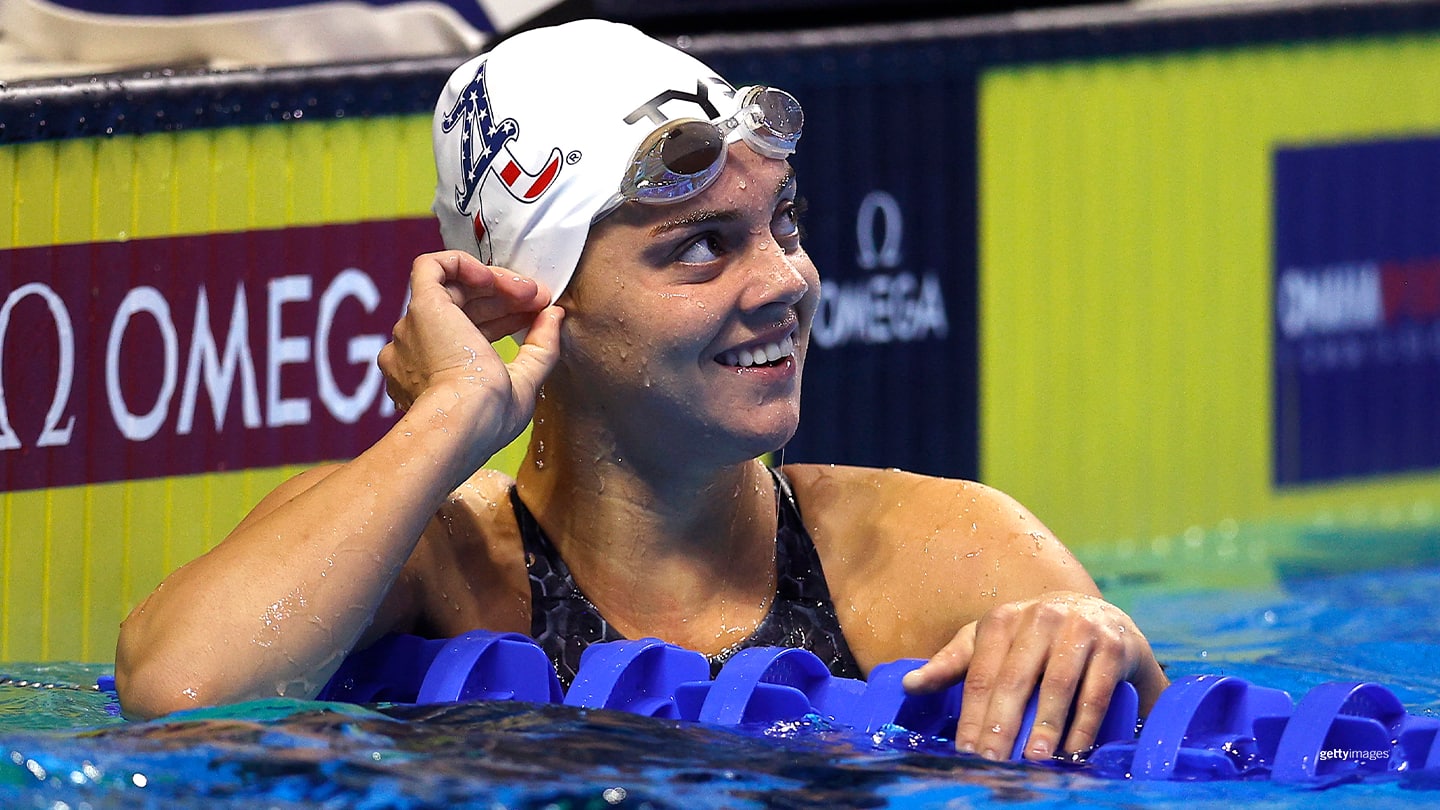
Rhyan White, 21, became an Olympic trials favorite this spring after finishing runner-up in both the 100 and 200-yard backstrokes at the 2021 NCAA championships. The University of Alabama swimmer then made her first Olympic team in both those strokes—the first to qualify for both backstrokes at the Olympic Games since Missy Franklin in 2012.
White met Franklin in 2015 and presciently told the Olympic gold medalist that she too would one day swim at the Olympic Games. White is the first Youth Olympic Games gold medalist (2018) to make the U.S. Olympic Team in swimming. In Buenos Aires, she finished third in the 100 backstroke, just 0.13 behind silver medalist Kaylee McKeown from Australia who now holds the world record. White grew up in Herriman, Utah.
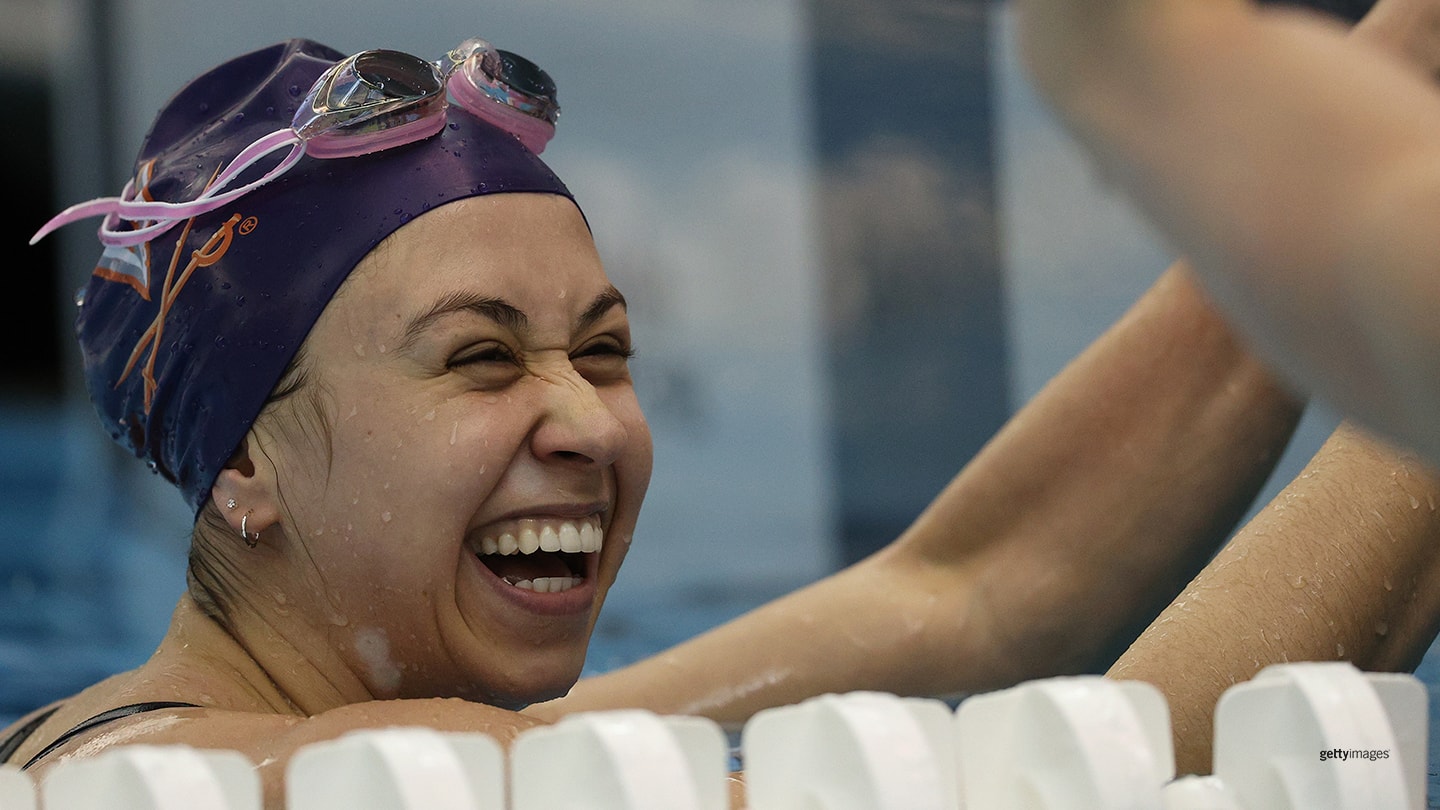
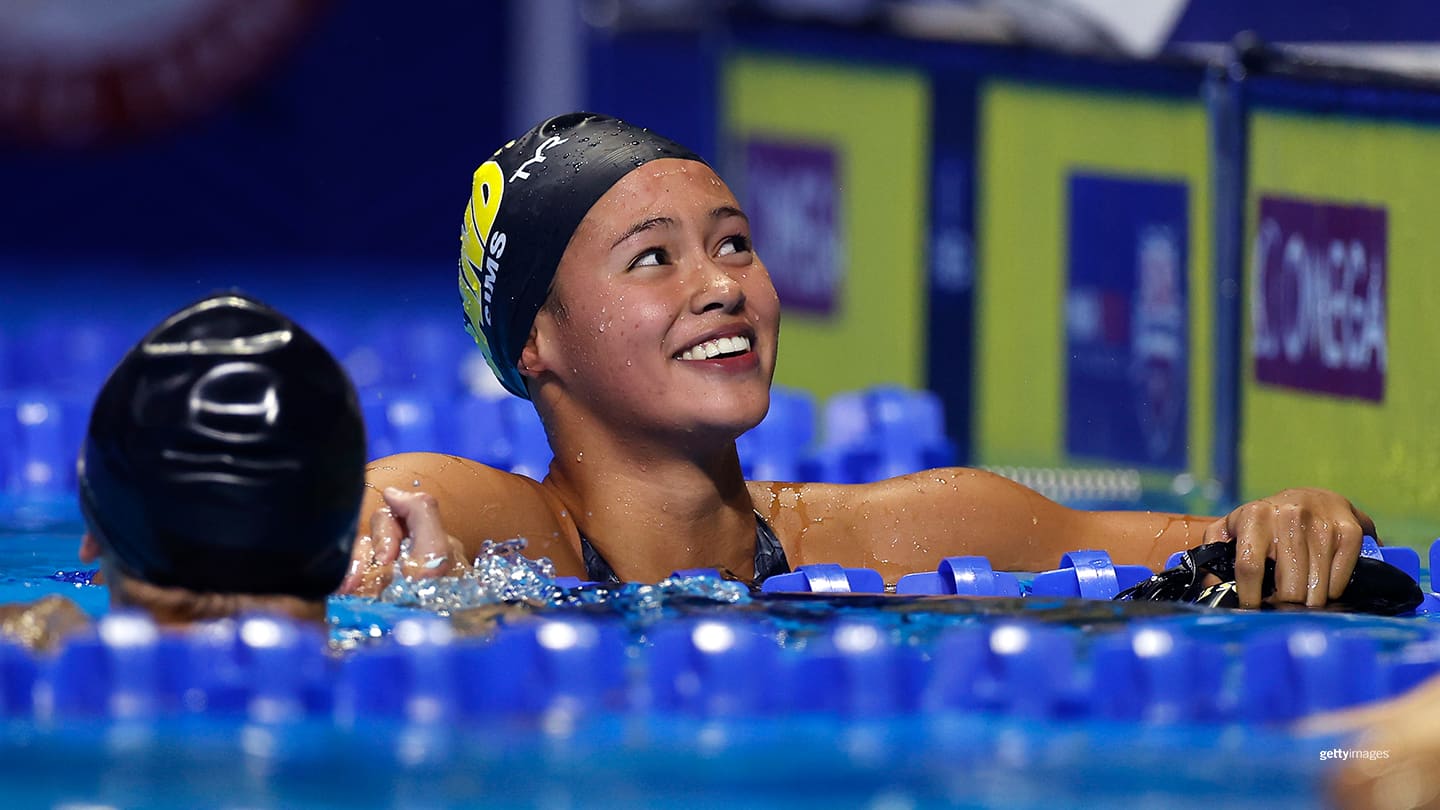
Fresh from her sophomore year in high school, Bella Sims made her first Olympic team as a prelim swimmer in the 4x200 freestyle relay. The 16-year-old only started training and racing five years ago — after the 2016 U.S. Olympic Team Trials, which she did not watch on TV. Before that, she was only taking swim lessons.
She trains with the Sandpipers of Nevada along with Erica Sullivan, who qualified to compete in the 1,500 freestyle in Tokyo. In the 200 freestyle, Sims dropped 2.5 seconds off her personal best, finishing fifth and scoring a relay prelim spot.
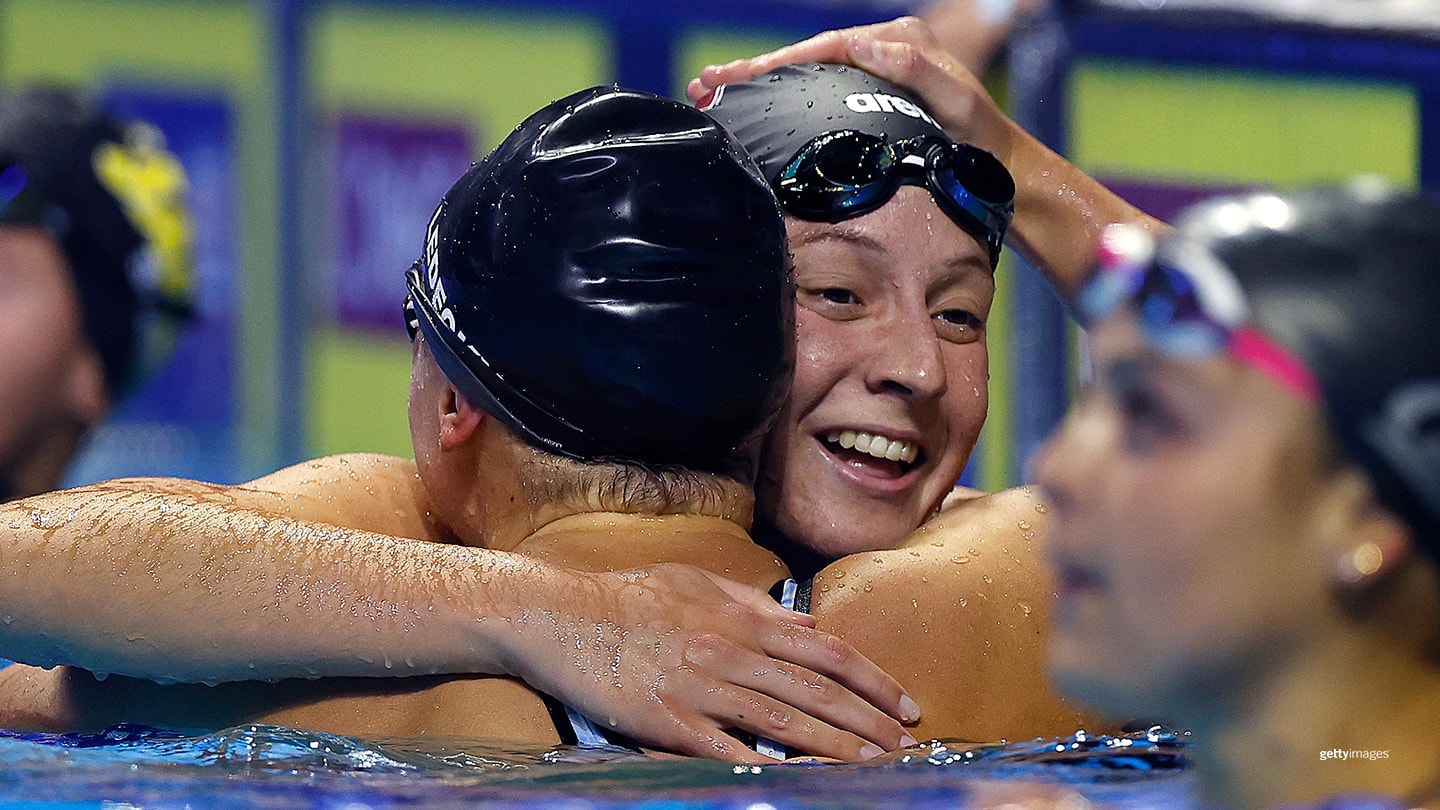
From Louisville, Kentucky, Brooke Forde, 22, just graduated from Stanford but will take a fifth year and will swim for the Cardinal (after the Covid-19 pandemic shut down the 2020 NCAAs). The reigning NCAA champion in the 400 IM, Forde made her first Olympic team after finishing sixth in the 200 freestyle, locking a spot as a prelim swimmer in the 4x200 free relay.
It made up for a disappointing 2016 trials when she was suffering from viral meningitis. She competed at 2019 worlds, finishing ninth in the 400 IM. Her mom was a swimmer at Northwestern University, and her two brothers also swam in college. Her dad, a sports reporter, is often seen in the press box.